常见重要句型
初中英语常见常考重点句型汇总(共121个)

初中英语常见常考重点句型汇总一、常见句型(80 个)【句型1】There+be +主语+地点状语/ 时间状语There's a boat in the river.河里有条船。
【句型2】I think “我认为.…” 否定式 I don't think...I think he is a good student.我认为他是个好学生。
I don't think any of them is interesting.我认为他们中任何一个都无趣。
【句型3】too...to..… 太……而不能...He is too young to go to school.他太小了不能去学校。
【句型4】It takes sb some time to do sth“干某事花了某人一段时间”,it是形式主语,后面的动词不定式(短语)才是真正的主语。
It takes him four hours to finish his homework.写作业花费了他四个小时。
【句型5】Though...+主句Though I like writing to my pen-friend,it takes a lot of time.虽然我喜欢给笔友写信,但它要耗费我大量时间。
【句型6】What about...?/How about...? “.…怎么样?”,about 为介词,其后须接名词、代词或 V-ing 等形式What about another cake? 再吃块蛋糕好吗?How about going out for a walk? 出去散散步好吗?【句型7】What's wrong with+sb. / sth. ?此句型相当于What's the matter/trouble with.后+某物作宾语时,意为“某物出什么毛病了?”后+某人作宾语时,意为“某人怎么了?”What's wrong with your watch?你的手表有什么毛病?【句型8】How do you like...?How do you like China?你觉得中国怎么样?【句型9】What do you like about...?What do you like about China?你喜欢中国的什么?【句型10】How+adj. / adv. +主语+谓语 !What a/ an+adj. +n. +主语+谓语 !How cold it is today!今天多冷啊!What a fine picture it is!多美的一幅图画呀!【句型11】had better (not)+动词原形You'd better ask that policeman over there.你最好去问问那边的那个警察。
常用句型之主语be形容词名词定语

常用句型之主语be形容词名词定语主语+be+形容词名词定语,是英语中常用的句型之一。
该句型用于描述主语的特征、性质、状态等。
通过运用不同的形容词和名词定语,可以使句子更加生动有趣,提升文章的表达力。
以下是一些常见的主语be形容词名词定语的句式和例句:1. 主语+be+形容词- The weather is beautiful today.(今天天气很好。
)- She is intelligent and hardworking.(她聪明又勤奋。
)- The book is interesting.(这本书很有趣。
)2. 主语+be+名词定语- My sister is a doctor.(我姐姐是医生。
)- The dog is a loyal companion.(这只狗是忠诚的伙伴。
)- This car is a high-performance vehicle.(这辆车是一辆高性能车。
)3. 主语+be+形容词+名词定语- The movie was a thrilling experience.(这部电影令人激动。
)- His speech was an inspiring moment for all of us.(他的演讲给我们所有人带来了启发的时刻。
)- The meal is a delicious treat.(这顿饭是一道美味的享受。
)4. 主语+be+形容词+不定式短语- My brother is excited to start his new job.(我哥哥很兴奋地开始了他的新工作。
)- She is eager to learn new things.(她渴望学习新的事物。
)- The students are happy to receive their exam results.(学生们很高兴地收到了他们的考试成绩。
)5. 主语+be+形容词+that从句- It is important that we take care of the environment.(保护环境是重要的。
固定句式知识点总结
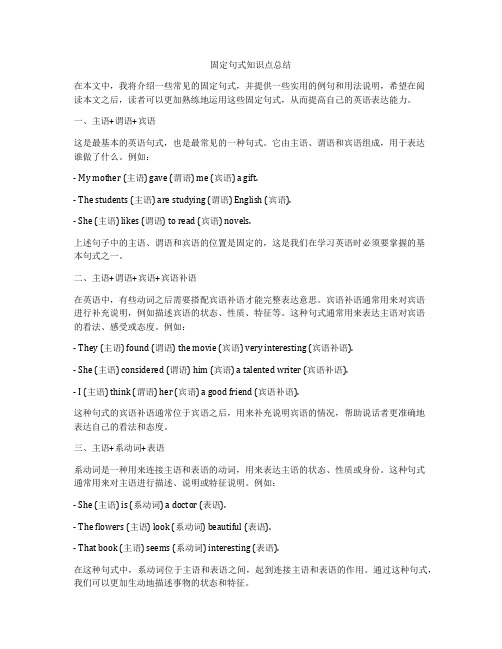
固定句式知识点总结在本文中,我将介绍一些常见的固定句式,并提供一些实用的例句和用法说明,希望在阅读本文之后,读者可以更加熟练地运用这些固定句式,从而提高自己的英语表达能力。
一、主语+谓语+宾语这是最基本的英语句式,也是最常见的一种句式。
它由主语、谓语和宾语组成,用于表达谁做了什么。
例如:- My mother (主语) gave (谓语) me (宾语) a gift.- The students (主语) are studying (谓语) English (宾语).- She (主语) likes (谓语) to read (宾语) novels.上述句子中的主语、谓语和宾语的位置是固定的,这是我们在学习英语时必须要掌握的基本句式之一。
二、主语+谓语+宾语+宾语补语在英语中,有些动词之后需要搭配宾语补语才能完整表达意思。
宾语补语通常用来对宾语进行补充说明,例如描述宾语的状态、性质、特征等。
这种句式通常用来表达主语对宾语的看法、感受或态度。
例如:- They (主语) found (谓语) the movie (宾语) very interesting (宾语补语).- She (主语) considered (谓语) him (宾语) a talented writer (宾语补语).- I (主语) think (谓语) her (宾语) a good friend (宾语补语).这种句式的宾语补语通常位于宾语之后,用来补充说明宾语的情况,帮助说话者更准确地表达自己的看法和态度。
三、主语+系动词+表语系动词是一种用来连接主语和表语的动词,用来表达主语的状态、性质或身份。
这种句式通常用来对主语进行描述、说明或特征说明。
例如:- She (主语) is (系动词) a doctor (表语).- The flowers (主语) look (系动词) beautiful (表语).- That book (主语) seems (系动词) interesting (表语).在这种句式中,系动词位于主语和表语之间,起到连接主语和表语的作用。
英语六级常用句式

英语六级常用句式以下是一些英语六级考试中常用的句式:It is + 强调部分+ that + 其他部分这个句型用于强调某个句子成分,如主语、宾语、状语等。
例如:It is the children who are the most important part of the family.主语+ 系动词+ 表语这个句型用于描述主语的性质或状态。
例如:The book is very interesting.主语+ 谓语+ 宾语这个句型是最基本的句型,用于描述主语执行的动作或行为。
例如:I love you.主语+ 谓语+ 间接宾语+ 直接宾语这个句型用于描述主语给予或传递某物给某人。
例如:I give him a book.主语+ 谓语+ 宾语+ 宾补这个句型用于描述主语执行的动作或行为对宾语产生的影响或结果。
例如:I found him sleeping.并列句由并列连词连接的两个或多个简单句构成。
例如:I like apples, but I don't like bananas.从句从句是复合句中的一个子句,用来修饰主句中的某个成分。
常见的从句类型包括名词性从句、定语从句和状语从句等。
例如:When he was young, he liked to play with his friends.倒装句将谓语或部分谓语放在主语之前,以强调某种情感或语气。
例如:Never have I seen such a beautiful place.省略句为了使语言更加简洁明了,可以省略一些不必要的成分。
例如:If you want to go to the party, you can come with me. (省略了主语和系动词)强调句通过使用强调词或强调结构来突出某个成分的重要性。
例如:It was she who solved the problem.。
英语中常见的句型

英语中常见的句型英语作为全球通用语言,其句型结构丰富多样,是构成语言表达的基础。
了解和掌握英语中常见的句型,对于提高英语水平、增强表达能力具有重要意义。
本文将系统介绍英语中常见的句型,并分析其结构、用法及在实际交流中的应用。
一、简单句简单句是包含一个主语和一个谓语的句子。
它是最基本的句型,用于表达完整的思想。
根据谓语的性质,简单句可分为以下几类:1. 主语+不及物动词例如:She smiled.(她笑了。
)2. 主语+及物动词+宾语例如:They bought a new car.(他们买了一辆新车。
)3. 主语+系动词+表语例如:He is a teacher.(他是一名教师。
)4. 主语+及物动词+间接宾语+直接宾语例如:John gave Mary a gift.(约翰给了玛丽一份礼物。
)5. 主语+及物动词+宾语+宾语补足语例如:We found the house empty.(我们发现房子是空的。
)二、并列句并列句是由并列连词连接的两个或多个简单句。
这些简单句在语法上是平等的,没有主次之分。
常见的并列连词有and、but、or等。
例如:She likes music, but he prefers sports.(她喜欢音乐,但他更喜欢运动。
)三、复合句复合句包含一个主句和一个或多个从句。
从句在句中充当主语、宾语、表语、定语或状语等成分。
根据从句的性质,复合句可分为以下几类:1. 名词性从句名词性从句包括主语从句、宾语从句、表语从句和同位语从句。
它们在句中分别充当主语、宾语、表语和同位语。
(1)主语从句例如:What he said is true.(他说的是真的。
)(2)宾语从句例如:I know that he is honest.(我知道他是诚实的。
)(3)表语从句例如:The problem is when we can arrive.(问题是我们什么时候能到达。
)(4)同位语从句例如:The rumor that he resigned is untrue.(他辞职的传言是不真实的。
英语常用句型解析

英语常用句型解析英语是全球通用的语言之一,而掌握好英语句型则是学好英语的第一步。
下面我们就为大家介绍英语常用句型,希望对大家的学习有所帮助。
一、陈述句陈述句是最常见的一类句型,用来陈述一个事实、情况或观点。
例句:1. I like pizza.(我喜欢比萨饼。
)2. The sun rises in the east and sets in the west.(太阳从东方升起,西方落下。
)3. He is a teacher.(他是一名教师。
)二、疑问句疑问句用来询问对方,一般以疑问词开头。
例句:1. What is your name?(你叫什么名字?)2. Where do you live?(你住在哪里?)3. When is your birthday?(你的生日是什么时候?)三、否定句否定句用来否定某件事情或状况。
例句:1. I don't like coffee.(我不喜欢咖啡。
)2. He doesn't speak Spanish.(他不会说西班牙语。
)3. They aren't coming to the party.(他们不来参加聚会。
)四、祈使句祈使句是用来表达请求、命令、建议等。
例句:1. Please be quiet.(请保持安静。
)2. Don't forget your umbrella.(别忘了带伞。
)3. Let's go to the movies.(我们一起去看电影吧。
)五、感叹句感叹句用来表达强烈的情感或感叹。
例句:1. What a beautiful day!(多么美好的一天啊!)2. I can't believe it!(我简直不敢相信!)3. How delicious this cake is!(这个蛋糕怎么这么好吃!)六、条件句条件句是指某件事情发生的前提条件。
例句:1. If it rains tomorrow, I will stay at home.(如果明天下雨,我会呆在家里。
常见的45个英语句型
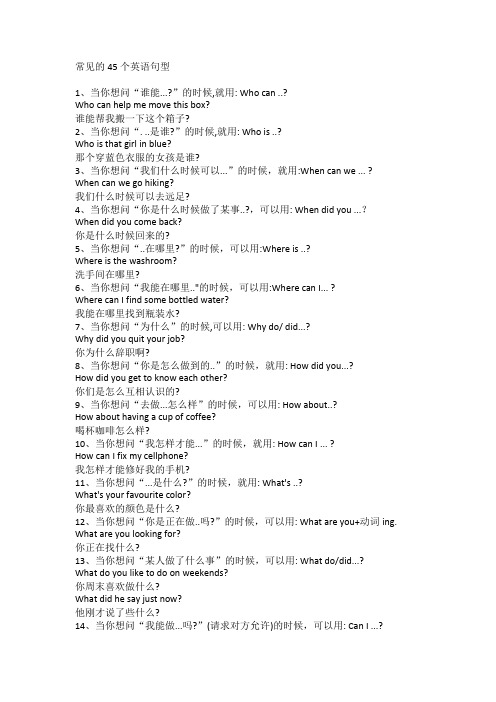
常见的45个英语句型1、当你想问“谁能...?”的时候,就用: Who can ..?Who can help me move this box?谁能帮我搬一下这个箱子?2、当你想问“. ..是谁?”的时候,就用: Who is ..?Who is that girl in blue?那个穿蓝色衣服的女孩是谁?3、当你想问“我们什么时候可以...”的时候,就用:When can we ... ? When can we go hiking?我们什么时候可以去远足?4、当你想问“你是什么时候做了某事..?,可以用: When did you ...?When did you come back?你是什么时候回来的?5、当你想问“..在哪里?”的时候,可以用:Where is ..?Where is the washroom?洗手间在哪里?6、当你想问“我能在哪里.."的时候,可以用:Where can I... ?Where can I find some bottled water?我能在哪里找到瓶装水?7、当你想问“为什么”的时候,可以用: Why do/ did...?Why did you quit your job?你为什么辞职啊?8、当你想问“你是怎么做到的..”的时候,就用: How did you...?How did you get to know each other?你们是怎么互相认识的?9、当你想问“去做...怎么样”的时候,可以用: How about..?How about having a cup of coffee?喝杯咖啡怎么样?10、当你想问“我怎样才能...”的时候,就用: How can I ... ?How can I fix my cellphone?我怎样才能修好我的手机?11、当你想问“...是什么?”的时候,就用: What's ..?What's your favourite color?你最喜欢的颜色是什么?12、当你想问“你是正在做..吗?”的时候,可以用: What are you+动词ing. What are you looking for?你正在找什么?13、当你想问“某人做了什么事”的时候,可以用: What do/did...?What do you like to do on weekends?你周末喜欢做什么?What did he say just now?他刚才说了些什么?14、当你想问“我能做...吗?”(请求对方允许)的时候,可以用: Can I ...?Can I take a look at your notebook?我能看一下你的笔记本吗?15、当你想问“你能做... 吗?”,提出请求的时候,可以用: Could you/Would you...? Could you tell me what time the store is open?你能告诉我这家店几点营业吗?16、当你想问“你是...吗?”的时候,就用: Are you...?Are you Mr. Brown?你是布朗先生吗?Are you making dinner now?你现在是在做晚饭吗?17、除此之外,问对方很多其他情况,都可以用: Doyou+动词...Do you need any help?你需要帮助吗?Do you mind if I open the window?你介意我打开窗户吗?18、当你想要问“你是否(已经)做了某件事”的时候,可以用: Have you ..? Have you seen the message I sent you?你(已经)看到我发给你的信息了吗?19、当你想问某事物的情况的时候, 可以用: Is it ..?Is it close to your house?那离你家近吗?20、当你想陈述自己的情况和观点的时候,可以用: I'm (not)+形容词/名词I'm good at dancing.我擅长跳舞。
语文各种句型

语文各种句型语文的句型是语言表达中非常重要的一部分。
不同的句型可以体现出不同的语言风格和表达效果。
本文将介绍一些常见的句型及其应用。
1. 主谓句主谓句是最基本的句型。
它由主语和谓语构成,表达出一个完整的意思。
例如:我喜欢吃水果。
这个句子的主语是“我”,谓语是“喜欢吃水果”。
主谓句适用于表述简单的事实、描述和陈述观点、表达命令等。
2. 并列句并列句是由两个或多个并列的主谓句构成的句子。
这些主谓句之间用逗号、分号或连词等连接。
例如:他喜欢看电影,她喜欢听音乐。
这个句子由两个并列的主谓句构成,中间用逗号连接。
并列句适用于表达对比、并列或转折等关系。
3. 复合句复合句包括主句和从句两部分。
其中,主句是完整的句子,而从句则是句子中的一部分,不能独立存在。
例如:我喜欢唱歌的时候,总是会忘记时间。
这个句子包括一个主句“我喜欢唱歌的时候”和一个从句“总是会忘记时间”。
复合句适用于表达因果关系、条件关系、时间先后关系等。
4. 祈使句祈使句是表示请求、命令、劝告等语气的句子。
它通常由一个动词或动词短语组成,而主语则省略。
例如:关上门。
这个句子省略了主语,直接表达了命令的语气。
祈使句适用于表达请求、命令、劝告和建议等。
5. 疑问句疑问句是用问句语气表达疑问的句子。
它通常以问句词或助动词开头。
例如:你明天要去看电影吗?这个句子以助动词“要”开头,表达了疑问的语气。
疑问句适用于询问信息和确认事实等。
6. 感叹句感叹句是表示强烈感情的句子。
它通常以感叹词或感叹性状语开头。
例如:多么美丽的风景啊!这个句子以感叹词“多么”和感叹性状语“美丽的风景”开头,表达了强烈的感情。
感叹句适用于表达喜悦、惊讶、惋惜等强烈的情感。
7. 单句省略句单句省略句是指省略了一些成分,但仍然可以表示完整的意思的句子。
例如:我们去看电影吧。
这个句子省略了主语“你”或“我们”,但是可以根据上下文推断出来。
单句省略句适用于日常口语中的简化表达。
8. 由主语和宾语构成的句式由主语和宾语构成的句式是句子中重要的句式之一。
句型常见的英语句型及其用法
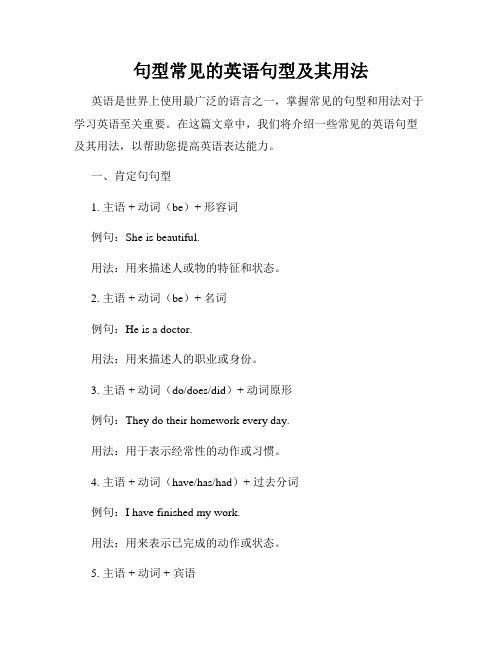
句型常见的英语句型及其用法英语是世界上使用最广泛的语言之一,掌握常见的句型和用法对于学习英语至关重要。
在这篇文章中,我们将介绍一些常见的英语句型及其用法,以帮助您提高英语表达能力。
一、肯定句句型1. 主语 + 动词(be)+ 形容词例句:She is beautiful.用法:用来描述人或物的特征和状态。
2. 主语 + 动词(be)+ 名词例句:He is a doctor.用法:用来描述人的职业或身份。
3. 主语 + 动词(do/does/did)+ 动词原形例句:They do their homework every day.用法:用于表示经常性的动作或习惯。
4. 主语 + 动词(have/has/had)+ 过去分词例句:I have finished my work.用法:用来表示已完成的动作或状态。
5. 主语 + 动词 + 宾语例句:She loves her dog.用法:用来表示动作的主体和对象。
二、否定句句型1. 主语 + 动词(be)+ not + 形容词例句:They are not happy.用法:用来表示否定的状态或特征。
2. 主语 + 动词(do/does/did)+ not + 动词原形例句:He does not like coffee.用法:用来表示否定的动作或习惯。
3. 主语 + 动词(have/has/had)+ not + 过去分词例句:We have not seen the movie.用法:用来表示否定的已完成动作或状态。
4. 主语 + do/does/did + not + 动词原形 + 宾语例句:She does not drink milk.用法:用来表示否定的动作和对象。
三、疑问句句型1. 助动词(be/do/does/did) + 主语 + 动词原形 + 其他?例句:Are you going to the party?用法:用来询问具体的情况或行动。
英语的重要句型

英语的重要句型
1、主语+谓语:这种句型是最基本的英语句型,它只包括主语和谓语,没有宾语和补语。
例如,“She sings beautifully”(她唱得很美)。
2、主语+谓语+宾语:这种句型包括主语、谓语和宾语,是最常见的英语句型之一。
例如,“She loves music”(她热爱音乐)。
3、主语+谓语+间接宾语+直接宾语:这种句型包括主语、谓语、间接宾语和直接宾语,通常用来表达谁做了什么事情。
例如,“She gave me a book”(她给了我一本书)。
4、主语+谓语+宾语+宾补:这种句型包括主语、谓语、宾语和宾语补足语,用来表达谁做了什么事情以及这个事情对其他事物的影响。
例如,“They made their hut with stones”(他们用石头建造了他们的棚屋)。
5、主语+谓语+状语:这种句型包括主语、谓语和状语,用来描述主语的动作或状态。
例如,“She sings beautifully every day”(她每天都唱得很好听)。
6、主语+系动词+表语:这种句型包括主语、系动词和表语,用来描述主语的性质、状态或身份。
例如,“She is a doctor”(她是一名医生)。
以上是一些英语中常用的句型,可以帮助您更好地理解和使用英语。
英译汉中常见重要短语典型句型
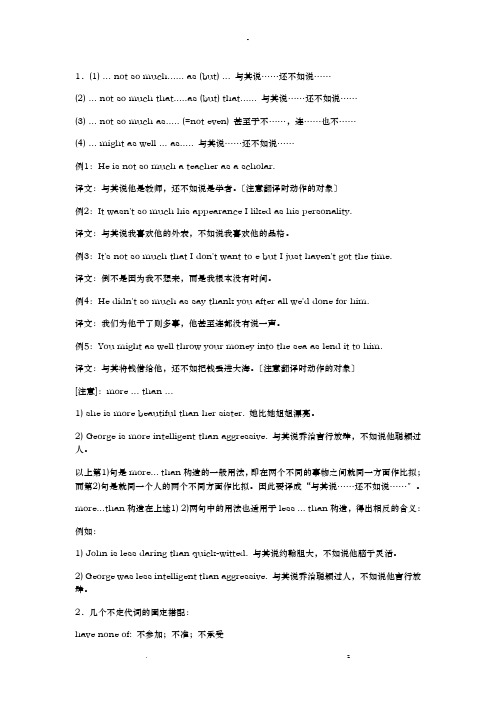
1.(1) ... not so much...... as (but) ... 与其说……还不如说……(2) ... not so much that.....as (but) that...... 与其说……还不如说……(3) ... not so much as..... (=not even) 甚至于不……,连……也不……(4) ... might as well ... as..... 与其说……还不如说……例1:He is not so much a teacher as a scholar.译文:与其说他是教师,还不如说是学者。
〔注意翻译时动作的对象〕例2:It wasn't so much his appearance I liked as his personality.译文:与其说我喜欢他的外表,不如说我喜欢他的品格。
例3:It's not so much that I don't want to e but I just haven't got the time.译文:倒不是因为我不想来,而是我根本没有时间。
例4:He didn't so much as say thank you after all we'd done for him.译文:我们为他干了则多事,他甚至连都没有说一声。
例5:You might as well throw your money into the sea as lend it to him.译文:与其将钱借给他,还不如把钱丢进大海。
〔注意翻译时动作的对象〕[注意]:more ... than ...1) she is more beautiful than her sister. 她比她姐姐漂亮。
2) George is more intelligent than aggressive. 与其说乔治言行放肆,不如说他聪颖过人。
英语常用的句型结构有哪些

英语常用的句型结构有哪些
英语是一个重要的学科,也是在社会上交流的必要语言,那幺下面小编
为大家集锦一些英语常用的句型及结构。
【一】英语常用的句型结构句型1:subject(主语)+verb(谓语)
这种句型中的动词大多是不及物动词,所谓不及物动词,就是这种动词后
不可以直接接宾语。
常见的动词如:
work,sing,swim,fish,jump,arrive,come,die,disappear,cry,happen等。
句型2:subject(主语)+link.v(系动词)+predicate(表语)
这种句型主要用来表示主语的特点、身份等。
其系动词一般可分为下列两类:
(1)表示状态。
这样的词有:be,look,seem,smell,taste,sound,keep等。
(2)表示变化。
这类系动词有:become,turn,get,grow,go等。
句型3:subject(主语)+verb(谓语)+object(宾语)
这种句型中的动词一般为及物动词,所谓及物动词,就是这种动词后可以直接接宾语,其宾语通常由名词、代词、动词不定式、动名词或从句等来充当。
注意:英语中的许多动词既是及物动词,又是不及物动词。
句型4:subject(主语)+verb(谓语)+indirectobject(间接宾语)+directobject(直
接宾语)
这种句型中,直接宾语为主要宾语,表示动作是对谁做的或为谁做的,在
句中不可或缺,常常由表示“物”的名词来充当;间接宾语也被称之为第二宾语,。
强调句六大句型

3.不。。。直到。。。
该句型常用于表示直到某个时间或事件才发生某事,其结构为:Not + till +被强调成分+才+其他成分。
例如:直到我做完作业,我才上床睡觉。
4.只。。。
该句型用于强调某个成分是唯一的、仅有的 Nhomakorabea其结构为:Only +被强调成分+其他成分。
例如:只有掌握了基本技能,才能进入高级水平。
5.都。。。
该句型用于强调全部或所有的成分,其结构为:All +被强调成分+其他成分。
例如:我想要的只是平静的生活。
6.强调做/做/做...
该句型用于强调动词,其结构为:Eforceatic do/does/did +被强调动词+其他成分。
例如:我确实爱你。
强调句是在一般陈述句的基础上,通过强调某个成分,使该成分更加突出、重要的句子。以下是六种常见的强调句型:
1.这是/曾经...那。。。
强调句型中最常用的一种,其结构为:It is/was +被强调成分+ that +其他成分。
例如:是玛丽按时完成了报告。
2.什么/怎么+形容词/副词+
强调句型中比较常见的一种,其结构为:What/How +形容词/副词+主语+谓语+其他成分。
初中英语重要句型初中英语写作中常见的十二种句型
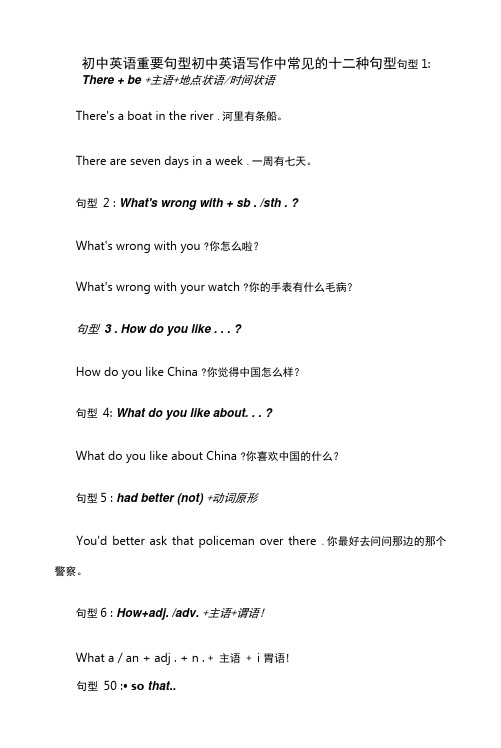
初中英语重要句型初中英语写作中常见的十二种句型句型1:There + be +主语+地点状语/时间状语There's a boat in the river .河里有条船。
There are seven days in a week .一周有七天。
句型2 : What's wrong with + sb . /sth . ?What's wrong with you 你怎么啦?What's wrong with your watch 你的手表有什么毛病?句型3 . How do you like . . . ?How do you like China 你觉得中国怎么样?句型4: What do you like about. . . ?What do you like about China 你喜欢中国的什么?句型5 : had better (not) +动词原形You'd better ask that policeman over there .你最好去问问那边的那个警察。
句型6 : How+adj. /adv. +主语+谓语!What a / an + adj . + n . + 主语 + i胃语!句型50 :• so that..Put the tree in the hole so that it is straight .把树放入洞穴中,让它立直。
句型51 : be + num . + metres / kilometres /years. . . + long/wide/deep/high/old...The Great Green Wall is 7 z 000 kilometres long .绿色长城长7000 公里。
The river is about 2 metres deep .这条:可大约有2 米深。
The boy is about 12 years old .这个男孩约12 岁。
英语中五种基本句型

英语中五种基本句型
1. 嘿,你知道吗,英语中有种句型叫主+谓,就像“I swim”,我游泳,多简单直接呀!
2. 主+谓+宾也很常见哦,比如“You eat an apple”,你吃个苹果,这不是很容易理解嘛!
3. 哇塞,主+系+表也很重要呢,像“He is happy”,他很开心,一下子就懂啦!
4. 还有主+谓+间接宾语+直接宾语呢,“I give him a book”,我给他一本书,这多有意思呀!
5. 主+谓+宾语+宾语补足语也别落下呀,“They made the room clean”,他们让房间干净,是不是很形象?
6. 哎呀,想想看,“He runs fast”,这不就是主+谓嘛,多简洁!
7. “She bought me a gift”,这就是主+谓+间接宾语+直接宾语呀,你说是不是很实用?
8. “The cake tastes delicious”,主+系+表呀,蛋糕尝起来美味,多生动!
9. “I saw him playing football”,主+谓+宾语+宾语补足语呢,我看见他在踢足球,很直观吧!
10. “They call him Tom”,也是主+谓+宾语+宾语补足语呀,他们
叫他汤姆,多好记!
我的观点结论就是:这五种基本句型真的是英语学习的基础呀,掌握了它们,英语学习就会轻松很多啦!。
英文写作常用句型分类总结5篇
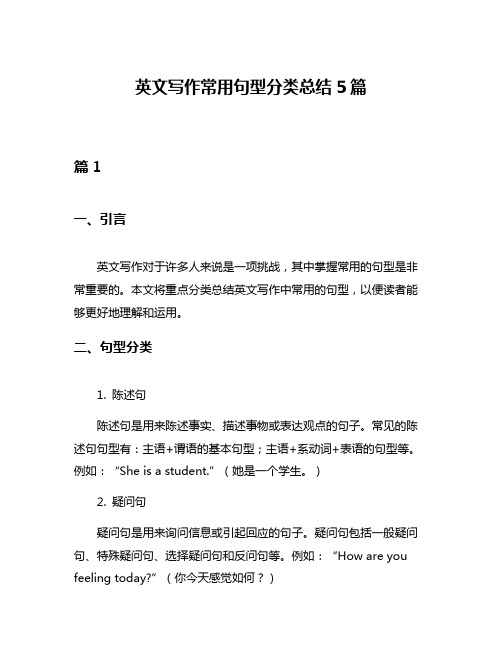
英文写作常用句型分类总结5篇篇1一、引言英文写作对于许多人来说是一项挑战,其中掌握常用的句型是非常重要的。
本文将重点分类总结英文写作中常用的句型,以便读者能够更好地理解和运用。
二、句型分类1. 陈述句陈述句是用来陈述事实、描述事物或表达观点的句子。
常见的陈述句句型有:主语+谓语的基本句型;主语+系动词+表语的句型等。
例如:“She is a student.”(她是一个学生。
)2. 疑问句疑问句是用来询问信息或引起回应的句子。
疑问句包括一般疑问句、特殊疑问句、选择疑问句和反问句等。
例如:“How are you feeling today?”(你今天感觉如何?)3. 感叹句感叹句用于表达强烈的情感或情绪。
常见的感叹句句型有:What a/an + 形容词+ 可数名词单数;How + 形容词+ 动词原形等。
例如:“What a beautiful day!”(多么美好的一天!)4. 祈使句祈使句用于表达请求、命令、建议或警告。
祈使句的常见句型包括:动词原形开头;Let's 开头等。
例如:“Please close the door.”(请关门。
)5. 并列句并列句由两个或多个简单句构成,通过并列连词(如and, but, or 等)连接。
例如:“I like coffee, but she prefers tea.”(我喜欢咖啡,但她喜欢茶。
)6. 复合句复合句包含一个主句和一个或多个从句。
常见的引导词有that, which, who等。
例如:“I know that she is a talented singer.”(我知道她是一个有天赋的歌手。
)三、常用句型举例1. 主语+谓语的基本句型:John sings beautifully.(约翰唱得很美。
)2. 主语+系动词+表语的句型:The weather is nice today.(今天天气很好。
)3. What a/an + 形容词+ 可数名词单数的感叹句:What a beautiful painting!(多么美丽的画啊!)4. How + 形容词+ 动词原形的感叹句:How fast he runs!(他跑得真快!)5. 并列句:She likes coffee, but her friend prefers tea.(她喜欢咖啡,但她的朋友更喜欢茶。
英语中常见实用的200个句型
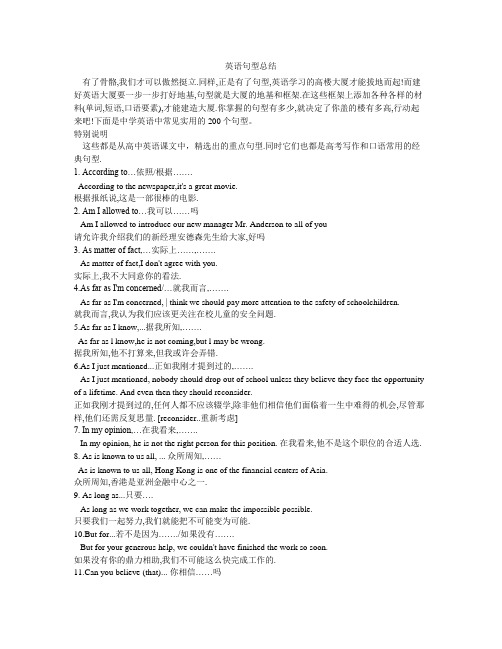
英语句型总结有了骨骼,我们才可以傲然挺立.同样,正是有了句型,英语学习的高楼大厦才能拔地而起!而建好英语大厦要一步一步打好地基,句型就是大厦的地基和框架.在这些框架上添加各种各样的材料(单词,短语,口语要素),才能建造大厦.你掌握的句型有多少,就决定了你盖的楼有多高,行动起来吧!下面是中学英语中常见实用的200个句型。
特别说明这些都是从高中英语课文中,精选出的重点句型.同时它们也都是高考写作和口语常用的经典句型.1. According to…依照/根据…….According to the newspaper,it's a great movie.根据报纸说,这是一部很棒的电影.2. Am I allowed to…我可以……吗Am I allowed to introduce our new manager Mr. Anderson to all of you请允许我介绍我们的新经理安德森先生给大家,好吗3. As matter of fact,…实际上……,…….As matter of fact,I don't agree with you.实际上,我不大同意你的看法.4.As far as I'm concerned/…就我而言,…….As far as I'm concerned, | think we should pay more attention to the safety of schoolchildren.就我而言,我认为我们应该更关注在校儿童的安全问题.5.As far as I know,...据我所知,…….As far as l know,he is not coming,but l may be wrong.据我所知,他不打算来,但我或许会弄错.6.As I just mentioned...正如我刚才提到过的,…….As I just mentioned, nobody should drop out of school unless they believe they face the opportunity of a lifetime. And even then they should reconsider.正如我刚才提到过的,任何人都不应该辍学,除非他们相信他们面临着一生中难得的机会,尽管那样,他们还需反复思量. [reconsider..重新考虑]7. In my opinion,…在我看来,…….In my opinion, he is not the right person for this position. 在我看来,他不是这个职位的合适人选.8. As is known to us all, ... 众所周知,……As is known to us all, Hong Kong is one of the financial centers of Asia.众所周知,香港是亚洲金融中心之一.9. As long as...只要….As long as we work together, we can make the impossible possible.只要我们一起努力,我们就能把不可能变为可能.10.But for...若不是因为……./如果没有…….But for your generous help, we couldn't have finished the work so soon.如果没有你的鼎力相助,我们不可能这么快完成工作的.11.Can you believe (that)... 你相信……吗Can you believe (that) this excellent song was composed by a high school student你相信这首美妙的歌曲是出自一个高中生之手吗12.Can you imagine... 你能想像……吗Can you imagine how she lived through all these difficulties你能想像她是怎么捱过种种困难的吗13.Could you please explain... 你能解释一下……吗Could you please explain why you didn't come to the meeting yesterday你能解释一下为什么昨天没来开会吗14.Can't we... 难道我们不能……吗Can't we just live in today, without the worries of tomorrow or the regrets of the past难道我们不能活在当下,不为将来担忧,不为过去叹息吗 [绝对六星级]15. Could you do me a favor and... 能否请你帮我一个忙…Could you do me a favor and give this present to Hilary for her birthday能否请你帮我一个忙,把这份生日礼物交给希拉里16.Do you by any chance know... 你(碰巧)知道……吗Do you by any chance know what time the movie begins 你知道电影什么时候开始吗17. Do you enjoy doing... 你喜欢做……吗Do you enjoy having a few friends around talking and laughing?你喜欢几个朋友聚在一起有说有笑吗18. Do you happen to know... 你(碰巧)知道……吗Do you happen to know how I can get to Times Square 你知道怎么去时代广场吗19. Do you have any good ways to... 你有没有……的好办法Do you have any good ways to promote our new product 你有没有什么推销我们新产品的好办法20. Did you know (that)... 你知道……吗Did you know (that) Daniel has won the first prize of the writing contest?你知道丹尼尔得了写作比赛的第一名吗长.21. Do you know if /whether... 你知道是否……Do you know if there are any apartments available in this area你知道这一带还有公寓出租吗22. Do/ Would you mind doing... 你介意做……吗Do you mind giving me a glass of water and some aspirin 给我一杯水和一些阿斯匹林,好吗23. Do/ Would you mind if... 如果……你是否介意Do you mind if I ask you a few questions 你介意我问你几个问题吗24. Do you realize (that)... 你有没有意识到……Do you realize (that) your parents really care about you? 你有没有意识到你的父母很关心你25. Do you think it is possible to... 你认为……可能吗Do you think it is possible to solve the problem overnight!一夜之间解决这个问题你觉得有可能吗26. Do you think it necessary to... 你认为有必要……吗Do you think it necessary to ask for official permission for the event to take place你觉得进行这项活动,有必要得到正式的批准吗27. ...doesn't make sense. 没有道理/没有意义/不清楚What you say doesn't make sense. I don't agree with you.你说的话没有道理.我不同意你的看法.28. Don't be afraid of... 不要害怕…….Don't be afraid of losing face. 不要害怕丢脸.29. Don't take it for granted that... 别认为……理所当然.Don't take it for granted that your parents should support you all your life.别以为你父母养你一辈子是天经地义的事.30. Don't waste time doing... 不要浪费时间做…….Don't waste time learning a lot of useless words in isolation. 不要浪费时间孤立地学习没有用的单词.学习英语单词最好的方法就是脱口而出尽量多的地道句子31. Don't you think that... 难道你不认为……吗Don't you think that the gap between rich and poor is getting wider难道你不认为贫富差距越来越大了吗 [五星级精品句]32. Excuse me for... 请原谅我…….Excuse me for interrupting, but I have something urgent to say.很抱歉打断你,但我有急事要说.[ urgent n. 紧急的;急迫的]33. For one thing,... For another,... 一方面……;另一方面…….For one thing, these shoes don't suit you. For another, they are too expensive.一方面,这双鞋子并不适合你;另一方面,这太贵了.34. From my point of view,... 在我看来,……From my point of view, Crazy English is the most effective way to learn English.在我看来,"疯狂英语"是学习英语最有效的方法.35. From where I stand,... 从我的立场来说,…….From where I stand we should support him no matter what happens.依我看,无论发生什么事,我们都应该支持他.36. Generally speaking,... 总的来说,…….Generally speaking, people like to hear compliments from others.总的来说,人们都喜欢听到别人的称赞.37. Hardly...when... 一……就……. [倒装句型]Hardly had she begun speaking when there was a knock on the door. 她刚开始说话就听到敲门声.38. Have you considered doing... 你有没有考虑过做……Have you considered going abroad to study 你有没有考虑过出国留学39. Have you decided... 你决定好……了吗Have you decided where to spend your summer vacation 你决定好去哪里过暑假了吗40. Have you ever been to... 你曾经去过……吗Have you ever been to Disneyland 你有没有去过迪斯尼乐园41. Have you thought about/of ... 你有没有想过……Have you thought about setting up your own business 你想过自己做生意吗42. Haven't you heard of ... 难道你没听说过……吗Haven't you heard of Crazy English established by Li Yang难道你没听说过李阳创立的疯狂英语吗43. How are you getting on / along with... ……进展如何/与……相处如何How are you getting on / along with your English study 你的英语学习进展如何44. How are you going to... 你打算如何……How are you going to celebrate your graduation 你打算如何庆祝你毕业45. How does...sound ……(听起来)怎么样How does making our appointment at 8 sound 我们把约会定在8点如何46. How l ong will it take you to... ……要用多长时间How long will it take you to recite such a passage 你背诵这么一段文章要多长时间47. How should I... 我该如何……How should I tell him the bad news 我该如何告诉他这个坏消息48. I absolutely agree with... …我完全同意…….Sure, I absolutely agree with your point. 当然,我绝对同意你的观点.49. I'm grateful for... 我对……特别感激.I'm grateful for your timely help. 非常感谢你及时的帮助.[timely adj.及时的]50. I am planning to... …我打算…….I am planning to travel around China. 我打算环游中国.51. I am very pleased to have this opportunity to... 我很高兴有机会…….I am very pleased to have this opportunity to stand here and give you a speech.我很高兴有机会站在这里为你们演讲.52. I apologize for... 我为……道歉.I apologize for leaving you alone. 很抱歉把你一个人留下.53. I believe (that)... …我相信…….I believe that we can conquer cancer totally some day. 我相信我们总有一天能够完全战胜癌症.54. I believe we should... 我认为我们应该…….I believe we should work together to protect our environment. 我认为我们应该携手保护环境.55. I can't imagine... 我无法想像…….I can't imagine what my life would be like if I were disabled.我无法想像如果我身患残疾,我的生活会怎样.56. I can't stand it when... 我无法忍受…….I can't stand it when people talk with their mouth full. 我无法忍受别人说话的时候满嘴食物.57.I didn't expect to...我没想到…….I didn't expect to receive such a pretty card from him. 我没想到能收到他寄来的那么漂亮的卡片.58. I didn't mean to... 我不是有意…….I didn't mean to offend you. 我不是有意要冒犯你的. [offend n.冒犯;得罪]59. I didn't realize... 我不知道…….俄没意识到…….I didn't realize how much this meant to you. 我没意识到这对你意义有多大.60. I (don't) feel like... 我(不)想…….1) I feel like going rock climbing with you this weekend. 这周末我想和你一起去攀岩.2) I really don't feel like going to the movies tonight. 我今晚真的不想去看电影.61 . I don't get very excited about... 我对……不怎么感兴趣.I don't get very excited about going to the concert. 我对去听演唱会不怎么感兴趣.62. I don't know how to... 我不知道如何…….I don't know how to answer the question. 我不知道如何回答这个问题.63. I don't see (that)... 我看不出…….我认为……不…….I don't see (that) she really intends to help us out. 我觉得她并不打算帮助我们.64. I don't think it is necessary to... 我认为没有必要…….I don't think it is necessary to leave so early.我认为没有必要这么早走.65. I don't think it's right to... 我认为……是不对的.I don't think it's right to bad mouth other people. 我认为说别人坏话是不对的.66. I doubt that /if /whether... 我怀疑哦不相信…….I doubt if what he said is true. 我不相信他所说的是真的.67.I dream of... 我梦想…….I dream of being a successful salesman. 我梦想成为一名成功的推销员.68. I'm dying to... 我渴望…….俄盼望…….I'm dying to leave for Beijing to meet my parents. 我盼望着去北京见我的父母.69. I feel very honored to... 我觉得很荣幸…….I feel very honored to be a member of this team. 能成为这个队的一员我深感荣幸.70. I'm fed up with... 我厌倦了…….我受够了…….I'm fed up with all these traffic jams. 我讨厌老是交通堵塞.71. It's bad/good manners to do...做...是(不)礼貌的1)It's bad manners to talk with a full mouth.嘴里吃着东西说话是不礼貌的。
英语口语中最常用的30个句型
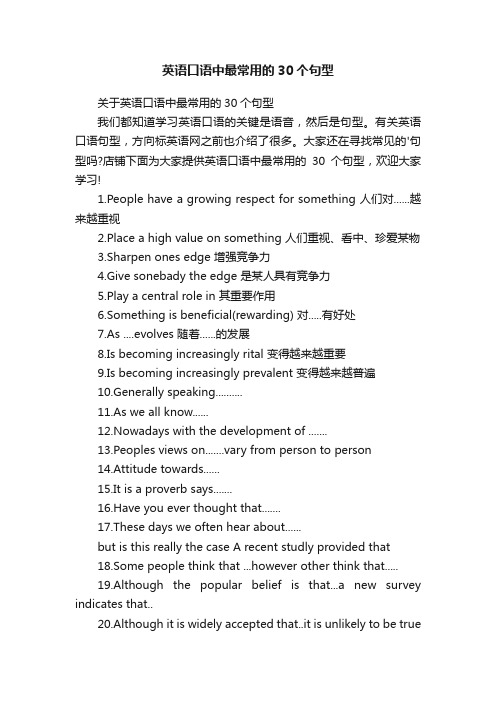
英语口语中最常用的30个句型关于英语口语中最常用的30个句型我们都知道学习英语口语的关键是语音,然后是句型。
有关英语口语句型,方向标英语网之前也介绍了很多。
大家还在寻找常见的'句型吗?店铺下面为大家提供英语口语中最常用的30个句型,欢迎大家学习!1.People have a growing respect for something 人们对......越来越重视2.Place a high value on something 人们重视、看中、珍爱某物3.Sharpen ones edge 增强竞争力4.Give sonebady the edge 是某人具有竞争力5.Play a central role in 其重要作用6.Something is beneficial(rewarding) 对.....有好处7.As ....evolves 随着......的发展8.Is becoming increasingly rital 变得越来越重要9.Is becoming increasingly prevalent 变得越来越普遍10.Generally speaking..........11.As we all know......12.Nowadays with the development of .......13.Peoples views on.......vary from person to person14.Attitude towards......15.It is a proverb says.......16.Have you ever thought that.......17.These days we often hear about......but is this really the case A recent studly provided that18.Some people think that ...however other think that.....19.Although the popular belief is that...a new survey indicates that..20.Although it is widely accepted that..it is unlikely to be truethat.21.It is one thing to believe that..it is quite another to say that..22.There are a variety of cause for this extraordinary growth in....First.....second.....finally....23.I fully agree with the stutement that....the reason are chieflyas follows....24.Judging from all evidence we may safely draw the concldsion that..25.Frow what hava been discussed above we may say that......26.All the evidence supports a condusion that.....27.It is therefore clear that.....So we must be aware of the importance of .......28.Since all of us have realized....why not.......29.It is high time we put an end to ....30.It is necessary that effective actions should be taken to preventthe situation......【关于英语口语中最常用的30个句型】。
英语写作中常见的十大句型

英语写作中常见的十大句型英语写作中常见的十大句型很多人在英语写作上,通常会遇到两个问题,一是无话可说,二是有话不知如何说,无论是哪一种情况,都会导致无从下笔的结果。
下面店铺为大家整理了英语写作中常见的十大句型,希望能帮到大家!1、Nothing is + ~~~ er than to + V / Nothing is + more + 形容词+ than sth例句:Nothing is more important than to receive education.没有比接受教育更重要的事。
2、cannot emphasize the importance of too much.(再怎么强调...的重要性也不为过。
)例句:We cannot emphasize the importance of protecting our eyes too much.我们再怎么强调保护眼睛的重要性也不为过。
3、There is no denying that + S + V ...(不可否认的...)例句:There is no denying that the qualities of our living have gone from bad to worse.不可否认的',我们的生活品质已经每况愈下。
4、It is universally acknowledged that + 句子~~ (全世界都知道...)例句:It is universally acknowledged that trees are indispensable to us.全世界都知道树木对我们是不可或缺的。
5、There is no doubt that + 句子(毫无疑问的...)例句:There is no doubt that our educational system leaves something to be desired.毫无疑问的我们的教育制度令人不满意。
语文句子句型包括哪些

语文句子句型包括哪些作为语文老师,句子是我们教学的重点之一。
句子是思想表达的基本单位,因此句子的结构对于语文学习和应用非常重要。
这篇文章将汇总句子中常见的句型,并说明其特点、用途和应用场景,希望能够帮助同学们更好地理解和运用句子。
一、简单句简单句是最常见的一种句型,它由一个主语和一个谓语构成,可以有宾语、宾补、定语、状语等成分。
简单句的结构简单明了,表达直观,是表述简单概念和事实的最基本方式。
以下是三个例子。
1.小明跑得很快。
这句话中,小明是主语,跑是谓语,得很快是状语。
这个句子表达了一个简单的事实,没有复杂的陈述和修辞手法,所以属于简单句。
2.狼来了。
这句话是一个很著名的故事开头,它表达了一种紧张和恐慌的情绪。
虽然这个句子只有两个字,但它构成了一个完整的简单句。
3.他买了一本小说。
这句话中,他是主语,买是谓语,一本小说是宾语。
这个句子表达了一个简单的动作和它的结果,属于简单句。
二、并列句并列句是由两个或者多个单独的句子并列构成的复合句。
它们之间通过连接词(如:和、但、或等)连接起来,意思是“以这个句子为主,但又有那个句子的补充和延伸”。
以下是三个并列句的例子。
1.这个房间很大,但是有点暗。
这个句子由两个单独的句子并列构成,中间通过连接词“但是”连接起来。
它表达了对房间的两方面感受,即空间大但是光线不足。
2.她喜欢看电影,也喜欢听音乐。
这句话由两个单独的句子并列构成,中间通过连接词“也”连接起来。
它表达了她对于两种娱乐方式的兴趣和偏好。
3.他又高又瘦,看起来很有型。
这句话由两个单独的句子并列构成,中间通过连词“又”连接起来。
它表达了对于一个人外貌特征的描述。
三、复合句复合句是由主句和一个或者多个从句构成的复杂句型。
从句是在主句中当做一个主语、宾语、表语、宾补等成分的元素,由引导词引出,不能单独存在。
以下是三个复合句的例子。
1.因为天气炎热,他决定去游泳。
这个句子由一个主句和一个从句构成,从句“因为天气炎热”作为一个说明原因的成分,引导词是因为。
- 1、下载文档前请自行甄别文档内容的完整性,平台不提供额外的编辑、内容补充、找答案等附加服务。
- 2、"仅部分预览"的文档,不可在线预览部分如存在完整性等问题,可反馈申请退款(可完整预览的文档不适用该条件!)。
- 3、如文档侵犯您的权益,请联系客服反馈,我们会尽快为您处理(人工客服工作时间:9:00-18:30)。
常见重要句型
1.It was (not )+ 时间段+before +一般过去时过了一段时间就……..
It will (not )be+ 时间段+before +一般现在时要过一段时间才会…
It is/ has been +时间段+ since…..
It was +点时间+ when…..
It was +时间状语+ that …..(强调句)
1).It was not long before he sensed the dangerof the position.不久他就意识到他处境危险
2).It will be half a year before you graduatefrom the school.还有半年你才从这个学校毕业
3).It is 3 years since he worked here.=he left here.(since从句中的谓语动词若是延续性动词,要从这个动作结束的时候算起)
4).It was 3 o’clock when they received thetelephone.
5)It was at 3 o’clock that they received thetelephone.
2.once…..一旦…..,表示时间和条件
1)Once you understand what the teacherexplained,you will have no difficulty doingthe work.
2).Once you have decided to do something,you should finish it and do it well.3.The +比较级…….,the +比较级……..越……,越……
1)The more books you read,the more knowledge you will get.
2)The busier he is,the happier he feels.
4.as if/ as though…..(表示与事实相反,用虚拟;若表示即将成为事实或有可能成为事实,则用陈述语气)
1).He was in great trouble,but he acted as if nothing had happened.2).Although they just met for the first time,they talked as if they had been friends formany years
3).The clouds are gathering.It looks as if it is going to rain.
5.n./adj./ adv./ v.+ as / though +主语+谓语,尽管……,…….引导让步状语从句
1).Child as he is,I already know what career I want to follow.
2).Try as he might,he couldn’t solve the problem.
3).Much as I respect him,I can’t agree with his idea.6.whether….or….无论是….还是….
1).Whether the weather is good or bad,they will set off as they planned.2).Any person,whether young or old,has his own worth.
7.疑问词+ever = no matter +疑问词,引导让步状语从句或名词性从句
1).Whichever(=Nomatter which)you like,you can take it away .(让步状语从句)
Youcan take away whichever(=anyone that)you like (名词性从句)2).Whenever you comes,you will be welcome.(让步状语从句)3).Whatever happens,I will support you.(让步状语从句)4).Whoever breaks the law,he will certainly be punished.(让步状语从句)Whoeverbreaks the law will certainly be punished.(名词性从句)5).However great the difficulty is,we can overcome it.(让步状语从句)8.as long as/so long as/ providing that/ provided that/ supposing that/on condition that 假如…..
1).I will lend you money on condition that youcan return it within 3 months.9.in case that/ in case of…..万一…..,以防…..
1).In case of fire,please dial 119 at once.
2).In case that John comes/ John should come,tell him to wait.
10.祈使句+ or/otherwise +结果句或祈使句+ and +结果句
1).Stop doing such foolish thing,or you will be punished in time.2).More effort,and the problem would have been settled.
3).Think it over,and you will find the answer.
11.so/ such……..that…….引导结果状语从句时须注意
当名词前many,much,little,few有修饰时,用so不用such因为此时的中心词不再是名词,而是many,much,little,few这些表示数量的词。
1).The westerners eat so much fat and sugarthat they put on weight easily.
2).There are so few fish in the lake that wecouldn’t fish them easily.
当名词是单数可数名词,前面又由adj.修饰时,注意冠词的位置,即so+ adj +a (n)+n或such+ a(n)+ adj.+ n
1).He is such an honest person/ so honest aperson that you can depend on him when you are in trouble.当so/such引导的部分位于句首时,主句要用部分倒装结构
1).Such great progress has he made in hisstudies that we all admire him.
当主从句主语一致时可与动词不定式相互转换,即变成so/such…….as to do结构。
1).The westerners eat so much fat and sugar asto put on weight easily.
12.so that 引导目的状语从句与结果状语从句
so that引导目的状语从句时常与情态动词连用(= in order that),当主从句主语一致时可转换为so as to do/ in order to do.
1).He turned up the radio a little so that hecould hear the news clearly.
He turned up the radio a little so as to hear the news clearly.
2).He closed all the windows while driving sothat he shouldn’t catch cold.(否定句中情态动词用shouldn’t)
so that 引导结果状语从句一般不与情态动词连用
1).He turned up the radio a little so that heheard the news clearly.。
